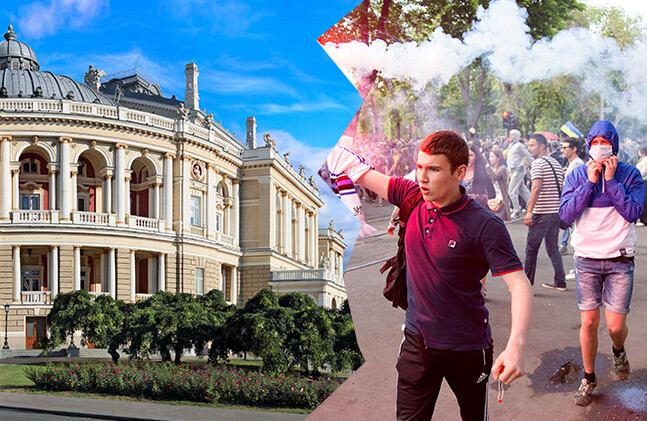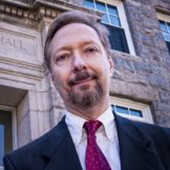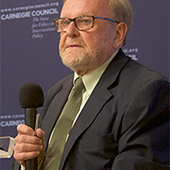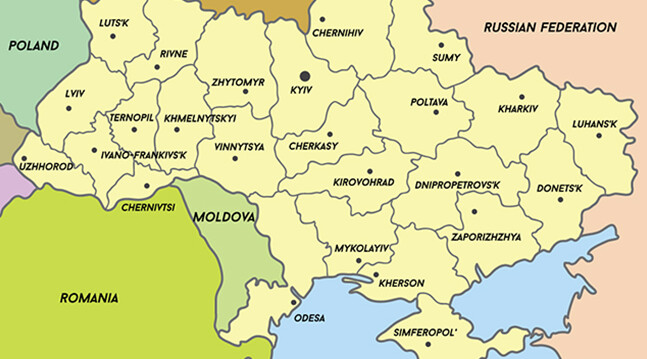With the deadly conflict in Ukraine spreading to this hitherto calm southern city, David Speedie speaks again with Dr. Nicolai Petro, professor of international relations at the University of Rhode Island, who is currently a Fulbright Fellow in Odessa.
DAVID SPEEDIE: I'm David Speedie, director of the program on U.S. Global Engagement at the Carnegie Council for Ethics in International Affairs. Welcome to another of our Security Bulletins.
These bulletins have in the past few weeks been following closely the developing and escalating crisis in Ukraine. We have been talking regularly with Dr. Nicolai Petro, from Odessa. Dr. Petro, a professor of international relations at the University of Rhode Island, is on a Fulbright Fellowship this year in Odessa and southern Ukraine.
Hitherto, we have been asking Dr. Petro to really follow events in other parts of Ukraine, beginning in Crimea and then in Eastern Ukraine and the Donbas region, where the crisis first developed. But over the weekend, this hit all too close to home for Nicolai Petro, with the deaths of at least 40 people in unrest that had spread to Odessa.
It's for that reason that we're delighted to have you here with us again, Nicolai, safe and sound, to follow up with a report from Odessa. Welcome back to the Carnegie Council.
NICOLAI PETRO: On this somber occasion.
DAVID SPEEDIE: Yes indeed.
First and foremost, Nicolai, how are you? How is your family? What is the situation in Odessa? Just begin with an overview of the general situation.
NICOLAI PETRO: We personally are doing just fine. We go out and about our daily routine as usual. But, as my wife was pointing out to me just recently, everywhere she has been, people are talking about what happened and why. It can be at the gym, in the marketplace, after church. It's a topic of persistent conversation.
The interesting thing, to my mind, is that people are still in the process of trying to figure out exactly what happened. There is clearly a reluctance to rely on the available news sources. I would say that there are three primary sources of news. One is the Ukrainian media. Another is the Russian media. Although its broadcasting has been suspended by the Ukrainian authorities since March 8, nevertheless a large number of people obviously are watching Russian news through the Internet. The third is blogs and social networks, where people are sharing an enormous amount of video that they have captured.
Each of these provides a distinctive perspective. I would say that the social media has become a real partner or a real contributor to this debate that challenges, in many instances, the official Ukrainian version of what happened on May 2.
DAVID SPEEDIE: Can you give us some details specifically as to the points of contention between the social media and the official Ukrainian version?
NICOLAI PETRO: The official version, as presented on major Ukrainian channels, suggests that the pro-Maidan forces were conducting a peaceful march in the center of the city when they were attacked by the anti-Maidan forces.
Sometimes it is suggested that the anti-Maidan forces brought in additional reinforcements from out of town or that they were not native Odessans.
Then in that clash, in addition, it is suggested that the anti-Maidan forces used weapons to shoot at the pro-Maidan forces, who then resorted to commandeering a fire truck to defend themselves.
Once that had calmed down a bit, a group of pro-Maidan individuals went down to Kulikovo Field, which is about a mile and a half from where the original events occurred. The suggestion in the official media is that they were chasing the anti-Maidan forces, who had weapons, to the tent city where the anti-Maidan forces had set up and that, in the process of pursuing them, they then destroyed the tent city and pursued them into the building.
Now, most recently, the local internal security forces, which have all been replaced here in Odessa during the last few days—apparently the new head had suggested that the people inside the building who were defending themselves accidentally set fire to themselves, and that's how the majority of deaths occurred.
I would say that this is pretty much contradicted by all of the videos, which show people in front of the building throwing Molotov cocktails at the building.
DAVID SPEEDIE: And I understand the death toll is in excess of 40 from the fire in that building, Nicolai.
NICOLAI PETRO: The official death toll so far is 46, but there are still 80 people hospitalized and 26 in very serious condition.
DAVID SPEEDIE: It's reported today, Nicolai, that a man named Igor Palitsya—I think I'm getting his name correct—has been appointed governor in Odessa. He has no previous ties to Odessa. I gather he's a friend of Mr. Kolomoisky, who was appointed governor of Dnipropetrovsk. This seems to be another of the Kiev's, the interim government's, strategy to appoint Western governors in places where there are no links, which may actually inflame the situation.
I gather that Kolomoisky visited Palitsya today or yesterday. This sounds like a shady character. First of all, he said, "Those who want to have any affiliation with Russia, I'll buy tickets for them." But, more ominously, there are reports that he has offered bounty to police forces for up to $100,000 for capture of subversive pro-Russian elements.
This seems like a rather inflammatory cocktail.
NICOLAI PETRO: He has been in office, what, 24 hours now. I haven't caught up with everything that he has said.
He is indeed a very wealthy individual, and his appointment seems to be part of a strategy to utilize, if not even co-opt, certain oligarchs to support the new regime. It has not proved effective certainly in Donetsk or even particularly in Dnipropetrovsk. I see no reason to expect that it will be more successful here.
Odessans are quite proud of their distinctive heritage within Ukraine and the historical community that they have established, which, I would underscore, has always been a cosmopolitan one. So for anyone to come in from elsewhere in Ukraine and bring some other type of either distinctly Ukrainian approach or even a distinctly Russian approach would simply not be well appreciated, I think, here. People like to, to put it simply—I guess the best model I can think of for Odessa is to live and let live.
Which leads me to speculate a little bit about the recent tragedy, in which people sort of take it for granted that because of how uncharacteristic these events were for the city, its culture and its temperament, it had to be instigated from people from out of town. Then what I've found, at least, is that people like to name their favorite personal villain. I think what your listeners might find interesting is that these personal villains range all over the map. They can be Russian special forces. They can be the Right Sector. They can be American mercenaries. They can be the former prime minister. They can be the siloviki (politicians from the security or military services) in Kiev.
It seems hard to imagine that you could have a plausible narrative involving all of these at once. But that's what makes it so very interesting to listen to these people. Some sort of coherent narrative can indeed be constructed. What they differ on mostly is the degree of plausibility.
But what I find interesting is that what seems entirely implausible to the average American can sound perfectly plausible at this point to the average Ukrainian.
DAVID SPEEDIE: And it certainly seems more plausible than the simplistic reporting hitherto that suggests that Russia is pulling all the strings here. That has actually been modified somewhat. There was a piece in The New York Times on Sunday, which you may have seen, "Behind the Masks in Ukraine, Many Faces of Rebellion." It really did, to some extent, modify the idea that all this is just Russia, the organ grinder and the performers in Ukraine doing Russia's bidding. It's a much more complex situation than that.
NICOLAI PETRO: I must say that one of the things that does not lend credibility to the interim government is that the automatic first accusation made by the security forces in Kiev to any event is that Russian special forces are somehow involved. They make this claim so gratuitously, without even bothering to provide any evidence, that it cannot really be taken seriously.
In the case of the fire, for example, in Odessa, the same claim was made. Yet we have, again, video from amateur video reporters who were in the building, looked at the documentation, and so far, as far as I can tell, all the people who died in this tragic fire appear to have been from Odessa.
DAVID SPEEDIE: Simplistic narratives are unhelpful in this case. The simplistic narrative is that, on the one hand, the Kiev government is a brave sort of David against the Russian Goliath trying to hold the country together.
NICOLAI PETRO: One thing we always have to keep in mind, I think, in our current analysis is that the government in Kiev is an interim government. I find it very difficult to speculate as to what it will look like and who will be in charge six months from now. The rotations of top positions, not just gubernatorial but in every sphere of society—in banking, in economics, certainly in the security sector—have been at a clip of a new person a month, a new head a month. At that point they will either very quickly run out of people and have to backtrack, I guess, to more qualified personnel from a previous presidency or simply rely on revolutionary enthusiasm, which I think also will eventually run dry, particularly if they have to implement rather stringent International Monetary Fund conditions.
So there have to be some compromises down the road. The question, to my mind, is, who in Kiev will actually make them? I don't see much willingness to do that.
For example, yesterday, I believe, there was an opportunity to vote, in general terms, for a referendum, one of the demands made by the rebels in the East, and a topic that has come up a number of times across the country. It did not pass in the parliament. So the parliament, at least, does not seem at this point amenable to having a dialogue with those who are discontented with the interim government in Kiev. I think we should keep in mind that, based on surveys that were done in April by the Kyiv International Institute of Sociology, the number of people who persist in the view that the interim government is illegitimate in their eyes is still well over half of the population. Even though they're not fighting in the streets, even though they don't necessarily want secession, they still have considerable doubts about the legitimacy of the government in Kiev.
DAVID SPEEDIE: And, of course, in that regard—two interesting observations. First of all, there's no schedule at this point for parliamentary elections. Is that correct?
NICOLAI PETRO: As far as I know. And that has always been one of the things—it was one of the principles of the February 21 accords, to have those be done in sequence, the presidential elections and the parliamentary elections. Again, it has been one of the demands often made for resetting and legitimizing the entire political structure in Ukraine.
DAVID SPEEDIE: And as far as the presidential elections, which I think are May 25—is that correct?
NICOLAI PETRO: Yes.
DAVID SPEEDIE: Speaking to your point of a moment ago, the depressing conclusion is that there's no real forward-looking figure there. All, including the frontrunner at this point and the former prime minister, Mrs. Tymoshenko, are basically people who have been part of the past, and therefore, one might be tempted to say, part of the problem.
NICOLAI PETRO: I've been watching the campaign ads, which are airing now, as well as the campaign posters that the candidates have put around the city. A few things strike me.
First of all, the Poroshenko campaign—and he's the frontrunner—seems to be—and this, I think, is a wise strategy—a feel-good campaign: "Vote for me and I will allow you to live a new life." That's his slogan, "to live anew." Exactly what he proposes is not at all clear. But it's a very slick campaign. He has himself addressing the military. He has himself taking a blessing from a priest. He has himself on a farm. It's a very Reaganesque, if you will, campaign.
DAVID SPEEDIE: Yes, it sounds like he has a Western political advisor here, media advisor.
NICOLAI PETRO: Perhaps. He also has a lovely—I wonder how this was done—he has a montage in one of his clips where he's standing in front of a group of riot police lifting his hands, and it seems like he's stopping them. There's a slew of these police, and he's there sort of orchestrating and telling them to stop. That's an interesting image.
Tymoshenko seems to be waffling, but that seems to be characteristic of her as a political figure. Someone who will say in the East, for example, which she has visited—she has met with some of the opposition leaders in Donetsk, and after speaking with them, she'll appear on national television and say, "You know, I've had a difficult discussion with the opposition leaders in the East, but they have their grievances and more politicians from Kiev should do what I do—I, of course, was the first to do so—and go and talk to them."
Then on national television, she'll say, "Ukraine is under attack from external forces and we need to rally the troops and do everything possible to defend ourselves. Our first priority should be national defense."
Those are somewhat inconsistent positions, given that the accusation from Kiev is that everything that's happening in the East is indeed instigated exclusively by Moscow. So she's trying to have it both ways there.
The third aspect, which probably hasn't been, at least as I understand it, really addressed in the Western media, is the fact that there has been an aggressive campaign of intimidation directed at all of the representatives of the former majority party, the Party of Regions. That would be Dobkin, Tihipko, Feydoff [phonetic], and even Boyko. These are individuals who, when they visit cities, are sometimes physically assaulted by nationalist groups. Their presentations are disrupted. It's hard for them to find a forum where they can talk. You do see one or two of them invited to speak on national television programs, but they are generally from their local district and the transmission being then piped in via satellite.
I think it's hard to call this an entirely open campaign when you have this kind of intimidation occurring with very little consequence or attempts to prevent this.
DAVID SPEEDIE: That's interesting. On a panel I did last week, a spokesman from Kiev lamented the fact that—when I mentioned the frontrunner, Poroshenko, and Tymoshenko, saying, "Where does this leave the people of the East in Russia?" he said, with sort of solemn earnestness, "It's a pity there is no Russophone candidate that can adequately represent these interests."
But you're suggesting that Russophone candidates are having an uphill task of this.
NICOLAI PETRO: There is that, and, of course, the party itself has suffered a psychological crisis, given that its leader, the former president, left the country and has been removed. It's the combination of the two that has destroyed the legitimacy both of the party and of the major candidates.
I, frankly, don't see why the nationalists who are attacking some of these candidates have to do that. It just adds to the fears of people in the East regarding the type of regime that they want to institute.
DAVID SPEEDIE: Yes, exactly.
You mentioned outside forces. Obviously, that's where Russia comes to mind. President Putin today made a statement that included three very interesting elements, Nicolai. I'm sure you've seen this. In a meeting with the president of Switzerland, the current head of OSCE, the Organization for Security and Cooperation in Europe, Putin said, first of all, that the Russian troops of about 40,000 on the border have been pulled back.
Second of all, he urged Eastern separatists to postpone the May 11 referendum "in order that conditions for dialogue are created."
He also described the May 25 presidential elections as "a step in the right direction."
What do you make of all that?
NICOLAI PETRO: Sounds promising. I'm not sure there is the capacity to be receptive among some Western leaders. It does appear to me that the German foreign minister is eager to restart a dialogue. I haven't heard the same willingness on the part of American or British leaders.
This leads me to what I see as the fundamental problem in the relations between the West and Russia with respect to Ukraine. The West seems to be under the impression that everything that is happening in Ukraine is Russia's fault, and therefore, if Russia would just back away or change its policies, everything would return to normal. I think that's a misreading of the situation. I think most of what is happening in the Eastern Ukraine is the result of unresolved indigenous problems.
I've written about that in a piece that's appearing in The National Interest this week, about six major mistakes, essentially, that guide Western foreign policy. They all boil down to the perception that Russia is the one to blame rather than these being problems indigenous to Ukraine.
Until we come to that realization, the likelihood of a dialogue between Russia and the West being fruitful is, I think, very slim.
DAVID SPEEDIE: Last question, Nicolai, that just occurs. We haven't really talked about the situation in the West of Ukraine at this point in time, where, in a sense, this all began, with discontent in the West against the overthrow of Yanukovych and so on and so forth. What is the situation in Lviv, in the West, at this point? Is all calm and stress-free? How do you see that at the moment?
NICOLAI PETRO: One really doesn't hear much. I suppose that's because they are content, at least, with the success of the efforts to oust Yanukovych and they see the regime in Kiev as sympathetic to their views.
It's not clear to me exactly how the majority of Western Ukrainians intend to keep Eastern and, to some extent, Southern Ukraine in a united Ukraine. I understand that the rhetoric from leaders there essentially boils down to the argument that all of the problems that have been raised are contrived. These include having Russian recognized as a second official language, greater autonomy, greater regional autonomy, concern about religion. Their view is that these were never issues that bothered them before; the fact that they're raising them now is not due to the way that the regime was instituted, but must be due to some sort of external influence.
Again, if that's their view, then I think they're mistaken. I recall reading a while back some surveys that do suggest that Western Ukrainians and Eastern Ukrainians actually don't visit each other or understand each other all that well. Travel used to be much more common, even in the Soviet period, East to West. As time has passed in independent Ukraine, they've grown more and more isolated from each other.
One of the consequences of that is the degree of violence, even extending down to real barbarism, against your political foes that one has seen in recent events.
DAVID SPEEDIE: A somber observation on which to end, Nicolai, that much of this is indigenous to Ukraine, that the role of external actors is exaggerated.
The main point today is that we're delighted to hear you safe and sound, and that life goes on somewhat normally in Odessa. Long may be that continue for you.
NICOLAI PETRO: We'll hope for the best for tomorrow. It's VE Day here.
DAVID SPEEDIE: Oh, yes.
NICOLAI PETRO: Some people are predicting unrest. But we will all hope for the best.
DAVID SPEEDIE: We do, too. It's always a great pleasure and privilege to hear from you. Your commentary is excellent—incisive and to the point. We wish you all best. We will be back in contact e'er long.
NICOLAI PETRO: Thank you.
DAVID SPEEDIE: Thank you so much, Nicolai.



